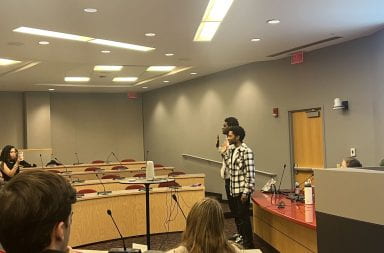Tina Fey and Paul Rudd are funny people. But their new film, “Admission,” out in theaters Friday, tries too hard to get a cheap laugh.
The film thrives in its dramatic moments. Bits of comedy are tossed in – perhaps to make the movie more widely appealing – but in the end these moments are what make it fall flat.
Fey stars as Portia Nathan, an uptight Princeton University admissions officer. We are introduced to her professor boyfriend Mark (played by Michael Sheen), with whom she lives a perfectly boring life.
Almost immediately after we get acquainted with Portia and Mark’s life, Mark announces he’s leaving her, then promptly speeds off in a convertible with a new woman.
This introduces a recurring comedic bit that never quite works. Throughout the film, Mark and new girlfriend Helen (Sonya Walger) show up just in time to witness Portia’s meltdowns and other moments that make her look like a mess. The interactions seem cheesy and forced, and never really draw a laugh.
The only comedy that consistently works comes from Portia’s brash, feminist mother Susannah (Lily Tomlin). Whether she’s threatening someone with a loaded gun or getting sultry with a Princeton professor, she provides the majority of the comic relief.
The film really pulls together through Portia’s interactions with Paul Rudd’s character, John Pressman, the principal at an alternative high school. John recruits Portia to visit the school to talk to his students about how to get into Princeton. Her visit is mainly aimed to benefit a promising student, Jeremiah Balakian (Nat Wolff), whom John seems to have taken special interest in, but isn’t really “Princeton material.”
“Admission’s” serious moments are its bread and butter. Fey impresses with her ability to transcend her mold as a comedic actor – a role she flourishes in – and proves she’s truly multi-talented.
Another key element to the film is its accuracy. “Admission” is based on the novel of the same name by Jean Hanff Korelitz, who formerly worked in Princeton’s office of admission and is married to a Princeton professor. The brutal admission process, complete with overbearing parents and over-proud alumni, is accurate to what Korelitz experienced in her job.
Woven into the plot along these lines is a competition between Portia and one of her co-workers for a promotion. It seems like a plotline that is given up on shortly after it’s introduced – a common theme in the movie.
“Admission” jumps all over the place, through smaller plotlines that are either never really resolved or are just irrelevant to the main plotlines among Portia, John and Jeremiah. Overall the film fails to deliver anything extraordinary aside from the scenes Rudd and Fey share. John is charming, and his persistence with Portia softens her up, adding a refreshing dynamic to her uptight character.
The viewer is still left with unanswered questions when the credits begin to roll, however. Namely, we find out that Portia and John went to college together, and he claims Jeremiah might be her son. But while we learn she secretly gave up a son for adoption while she was in college, it is never really clear how he came to that conclusion. With loose ends and dead-end plotlines, I was left with more unanswered questions than satisfaction.
“Admission” is well-casted, but the script couldn’t live up to the film’s wealth of talent. The film isn’t a waste of time, but it’s certainly not a must-see either.
Grade: C


